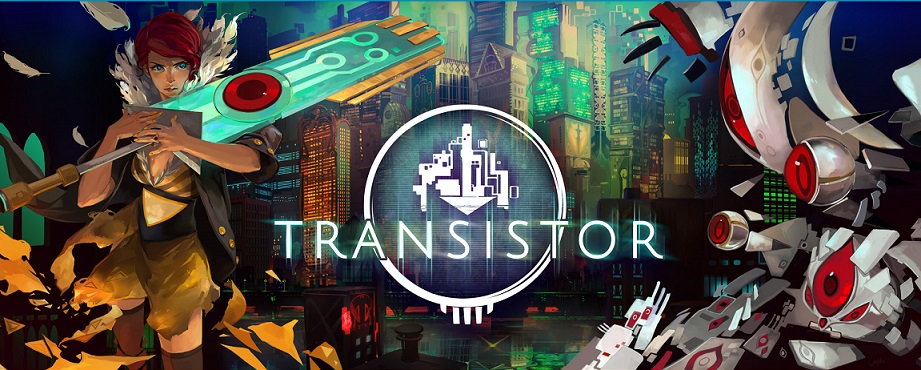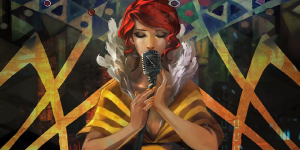Transistor’s Music as an Added Layer of Story
By Marcus Estrada
[divider]Transistor is our August 2014 “Not Crowdfunded, But…” title. For more Transistor content head over here.
Note: This post includes heavy story spoilers for Transistor.
Transistor is a beautiful game in many ways. Players will outright recognize the visuals as gorgeous, but very quickly fall for the soundtrack as well. Transistor’s music is a high point – and in fact more important to the game than most. This is because its lead character, Red, has herself cultivated some of the songs. After all, before her adventure began she was popular musician in Cloudbank. Unfortunately, as we see in the very beginning, Red has lost her voice entirely. Thankfully, Transistor still allows her to speak via lyrical tracks.
Of course, it’s not only these four tracks that contribute to the mood of Transistor. Every piece of background music feels tailored to where it appears. Songs are typically sober, sometimes more technical-sounding, and other times a bit more acoustic. Above all else every song has a similar theme working through its core – this sound hallmark keeps everything together. Musician Darren Korb deserves serious attention for creating such a comprehensive and distinct sound for Transistor. Without this, the gorgeous art and engaging RTS gameplay would have felt incomplete.
But because the game is so pointedly focused around a singer who has lost her voice it would be foolish to ignore vocal tracks attributed to her. Red’s music, as sung by vocalist Ashley Barrett, is ultimately haunting. Yet the tracks are also beautiful. It’s in looking at the lyrics that one might even unravel the story – and what happens at the very end.
Songs like “The Spine” and “In Circles” feel as though Red views herself as handling an unbearable burden. From the former song, she defines the world’s spine as her own that’s “twisted and tied.” From “In Circles” she constantly repeats “I won’t save you.” She cannot bear this – whatever ‘this’ is. As for who she cannot save it seems fair to assume it could be the man she hears within the Transistor itself. Although he loves Red he seems to know that in the end they cannot be reunited. Yet, that appears to be what Red eventually does by piercing her body with the Transistor.
This act is confusing and opposed to the lyrics of “We All Become.” Notably, one section contains the following lines: Stop grieving, start leaving / Before we all become one / Run. The Camerata have removed people from Cloudbank via the Process. Of course, they also once maintained control of the Transistor itself which is able to contain multiple realities and personas within it. Not only does Red’s love reside within it, but so too do other citizens of Cloudbank. If “We All Become” is taken as literal, Red seems to advocate for leaving the city before everyone becomes absorbed into a digital database.
Advocating against the Cameratas’ goals is present in more than one of her songs. “Signals” states this concept again in more obvious terms with “I won’t become a number in the system / Zeroes and ones / Not me.” For her mindset, she appears unable to believe that ‘becoming one’ is in any way ideal and rebels against it. Her words were potent during this period of social unrest in Cloudbank and helped her become a target. She may be alive at the start of Transistor but she had already lost her most powerful weapon – her own voice.
Was this a part of why, after defeating the Camerata, she ‘kills’ herself? By the end of Transistor it really does feel that there’s nothing left for Red to fight for. The world is beautiful but no one is left to build it back up beyond her. In “Paper Boats” she sings of always finding someone. Although the man within the Transistor loves Red desperately, he begs her to stop from stabbing herself with the sword. He knows, as well as she does, that this would invalidate her strong ideals against “becoming one” with everyone. Yet, she gives in to finally return to him. Or does she? What exactly is it that the credits are showing us when the two are depicted as joyous in pastoral scenery?
The Country is referenced multiple times in the game as well as in “We All Become.” She sings “Think I’ll go where it suits me / Moving out to the country.” But is this a real countryside or the Country within Transistor? Weirdly, the Camerata suggest there is a sort of alternate reality within the device – and there’s no way back. Although Red may have chosen love in the end, she may have sacrificed her ideals. Or perhaps she has died and moved onto another plane with her love’s spirit as well. Who can say? Transistor’s soundtrack provides many hints, but at the end of the day it’s up to each player to determine how Red’s journey concludes.
[divider][Google][pinterest][follow id=”Cliqist” size=”large” count=”true” ] [author image=”http://cliqist.com/wp-content/uploads/2014/01/marcus.jpg” ]Marcus is a fellow with a love for video games, horror, and Japanese food. When he’s not writing about games for a multitude of sites, he’s usually still playing one. One day when he became fed up with the way sites would ignore niche titles he decided to start his own site by the name of Pixel Pacas. Writing about video games is something he hopes to continue doing for many years to come. Some of Marcus’s favorite games include Silent Hill 2, Killer7, and The Sims. [/author]








[…] 8/26 – Transistor’s Music as an Added Layer of Story […]
[…] like action RPG’s, you should really try Transistor, because the art style, the story and the music are amazing. I’m not going to go into all those things because we already have, I’m just here […]